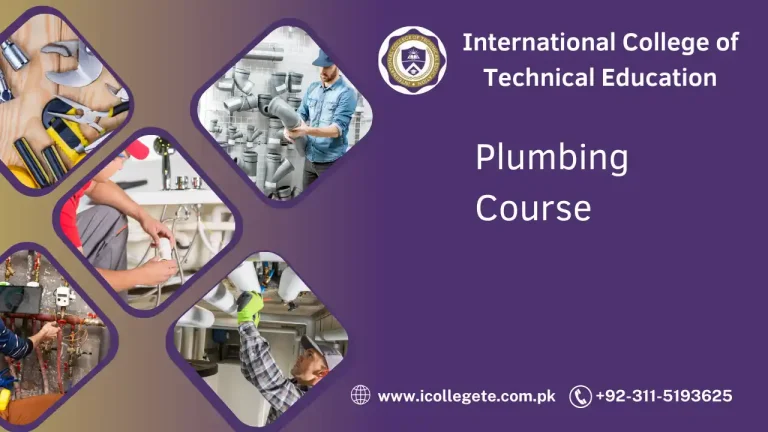In today’s competitive market, ensuring product quality is more crucial than ever. Organizations are constantly striving to meet high standards and customer expectations, and this has led to an increased demand for professionals skilled in Quality Control (QC). Faisalabad, being a hub of industrial activity in Pakistan, has seen a growing interest in specialized courses that equip individuals with the expertise to manage and control product quality effectively. The Quality Control course in Faisalabad offers aspiring professionals the knowledge and tools necessary to ensure that products meet the required standards and regulations.
The Quality Control course is designed to provide students with an in-depth understanding of quality management systems, statistical quality control, testing methods, and the regulatory frameworks governing product quality. This course introduces essential concepts, tools, and techniques that are used in industries to maintain the highest standards in production processes and ensure that the final products meet customer expectations. Whether you are looking to enhance your career in manufacturing, pharmaceuticals, food production, or any other industry requiring stringent quality control measures, this course is the perfect foundation.
Course Overview
The Quality Control course focuses on both theoretical and practical aspects of quality management. It explores the principles of quality assurance and the methods used to control, monitor, and improve product quality. Students will learn to identify common quality issues and apply corrective actions to improve processes. The course content includes:
- Introduction to Quality Control: Understanding the basics of quality, the importance of quality control, and the impact on business operations.
- Quality Control Tools and Techniques: Learn how to use statistical methods and tools such as control charts, histograms, and Pareto analysis.
- Quality Standards and Regulations: A look at national and international standards like ISO 9001, GMP, and other regulatory frameworks.
- Quality Assurance vs. Quality Control: A distinction between ensuring quality through assurance and maintaining quality through control measures.
- Process Control and Improvement: Methods for monitoring production processes and implementing corrective measures to improve quality.
- Risk Management in Quality Control: Understanding the risks associated with poor quality and how to mitigate them effectively.
The course is structured to offer both theoretical learning and hands-on practical training, ensuring that students can apply their knowledge in real-world settings.
Study Units
The Quality Control course typically covers the following study units:
- Introduction to Quality Control and Quality Management Systems
- Statistical Quality Control (SQC)
- Quality Control Tools and Techniques
- Standards and Regulations in Quality Control (ISO, GMP, etc.)
- Process Control and Improvement
- Root Cause Analysis and Corrective Action
- Risk Management in Quality Control
- Supplier Quality Management
- Auditing and Compliance in Quality Control
- Final Project/Case Study on Quality Improvement
These units ensure that students have a comprehensive understanding of the entire quality control process, from theory to practical application.
Learning Outcomes
Upon completing the Quality Control course, students will be able to:
- Understand the fundamental principles and concepts of quality control and quality assurance.
- Apply statistical tools and techniques to monitor and improve product quality.
- Interpret and implement national and international quality standards and regulations.
- Identify quality issues within production processes and develop effective corrective actions.
- Develop and implement effective process control systems to ensure consistent product quality.
- Analyze risks associated with quality management and develop strategies to mitigate them.
- Conduct quality audits and ensure compliance with regulatory standards.
Course Benefits
- Industry-Relevant Skills: This course provides students with the essential skills needed to ensure quality control in a variety of industries, making them highly employable in the quality management field.
- Increased Job Opportunities: As industries continue to expand, there is a growing demand for quality control professionals to ensure product integrity. This course opens up numerous job opportunities in sectors like manufacturing, pharmaceuticals, food production, and more.
- Improved Career Prospects: A certification in quality control can significantly enhance your career prospects, making you eligible for roles such as Quality Control Inspector, Quality Assurance Manager, or Process Improvement Specialist.
- Global Recognition: The knowledge of international quality standards and regulations will make you a valuable asset to organizations that operate globally.
- Hands-On Learning: With practical training and case studies, students gain real-world experience that will prepare them to handle quality control challenges effectively.
Who is This Course For?
The Quality Control course is ideal for:
- Fresh Graduates: Individuals with degrees in engineering, manufacturing, chemistry, or related fields looking to specialize in quality control.
- Industry Professionals: Employees working in production, manufacturing, or supply chain roles who wish to enhance their knowledge of quality control techniques.
- Managers and Supervisors: Those in managerial or supervisory roles within production teams who need to ensure quality compliance and process improvement.
- Entrepreneurs: Business owners or entrepreneurs running manufacturing or production companies who wish to establish or improve their quality control systems.
- Anyone Interested in Quality Management: Anyone who has a passion for maintaining high standards and ensuring that products meet the desired quality.
Future Progression for This Course
The Quality Control course provides excellent career progression opportunities, with graduates able to pursue various roles in the quality management field. Some potential career paths include:
- Quality Control Inspector: Responsible for ensuring products meet the required standards through inspections, tests, and audits.
- Quality Assurance Manager: Oversee the implementation of quality assurance systems and ensure compliance with industry regulations.
- Process Improvement Specialist: Focus on optimizing production processes to enhance efficiency and product quality.
- Quality Control Analyst: Analyzing production data to identify areas for improvement in quality control processes.
- Compliance Officer: Ensuring that companies adhere to regulatory quality standards and implementing corrective actions when necessary.
- Supply Chain Quality Manager: Managing the quality of raw materials, components, and finished products throughout the supply chain.
- ISO Auditor: Specializing in auditing quality management systems to ensure that they meet international standards.
Additionally, individuals with a background in quality control can continue their studies in related fields such as Six Sigma, Lean Management, and Total Quality Management (TQM), further enhancing their qualifications and career opportunities.
The Quality Control course in Faisalabad offers an incredible opportunity to develop the skills needed to excel in one of the most crucial areas of modern industries. Whether you’re just starting your career or looking to upskill, this course provides the theoretical knowledge and practical experience needed to ensure quality in every step of production. With a wide range of career opportunities and the potential for global recognition, the Quality Control course is a wise investment for anyone interested in making a significant impact in the world of product quality.







